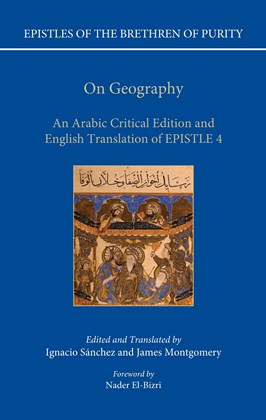On Geography An Arabic Critical Edition and English Translation of Epistle 4
Oxford University Press in association with the Institute of Ismaili Studies
The Ikhwān al-Ṣafā’ (Brethren of Purity), the anonymous adepts of a tenth-century esoteric fraternity based in Basra and Baghdad, hold an eminent position in the history of science and philosophy in Islam due to the wide reception and assimilation of their monumental encyclopaedia, the Rasāʾil Ikhwān al-Ṣafāʾ (Epistles of the Brethren of Purity). This compendium contains fifty-two epistles offering synoptic accounts of the classical sciences and philosophies of the age; divided into four classificatory parts, it treats with themes in mathematics, logic, natural philosophy, psychology, metaphysics, and theology, in addition to didactic fables.
The present volume, prepared by Ignacio Sánchez and James Montgomery, contains the first critical edition of the fourth epistle of this compendium and an annotated English translation.
Epistle 4: ‘On Geography’ contains a description of the Earth and its climes. It is of great significance for our understanding of both the Islamic geographical tradition and the world view of the Ikhwān al-Ṣafāʾ. It clearly shows that its authors were familiar with the Ptolemaic tradition, as the main sources used in its composition can be traced. But it is also a propaedeutic work which provides the intellectual tools needed to decipher the signs of God’s Creation, and to understand the phenomena of the sub-lunar world in terms of the cosmological order. This epistle epitomises many of the central themes in the conceptual universe of the Ikhwān al-Ṣafāʾ, such as the notion of science as a path to superior knowledge of God, and the relationship between microcosm and macrocosm as part of the divine design.
Acknowledgements
Foreword
Introduction
Epistle 4: On Geography
Appendix 1: Comparison of the Description of the Climes in the text of the Epistle on Geography of the Ikhwān and the Compendium of al-Farghānī
Appendix 2: Co-ordinates of the cities of the seven climes compared with al-Khwārizmī’s values
Appendix 3: Cities of the seven climes listed in the tables of all the manuscripts
Appendix 4: Tables of cities and co-ordinates
Bibliography
Index
Risāla 4 (Arabic Text and Variants)
Arabic Index
Ignacio Sánchez obtained his PhD from the University of Cambridge in 2011, with a dissertation on al-Jāḥiẓ’s treatises on the imamate. He has worked at Cambridge University Library (2010–2012), as part of the team of the Oxford and Cambridge Islamic Manuscripts Catalogue Online Project, and the Digital Library; and at the Institute of Historical Sciences of the Humboldt University in Berlin (2012–2014), on an interdisciplinary project to compile an encyclopaedia of mediaeval endowments and charitable foundations. Currently he is a research fellow at Warwick University, where he works on the Oxford/Warwick Ibn Abī Uṣaybiʿa Project.
James Montgomery is Sir Thomas Adams Professor of Arabic at the University of Cambridge, a Director of Studies and Fellow of Trinity Hall. He held a Lectureship at Glasgow and Senior Lectureships at Oslo and Leeds before joining Cambridge in 1997. He founded the journal Middle Eastern Literatures and its monograph series Studies in Arabic and Middle Eastern Literatures. He also contributed to setting up the Third Edition of the Encyclopaedia of Islam and delivered the prestigious Rosenthal Memorial Lecture in Ancient and Near Eastern Civilizations at Yale in 2008. His most recent publications include Al-Jāḥiẓ: In Praise of Books (Edinburgh: Edinburgh University Press, 2013).

